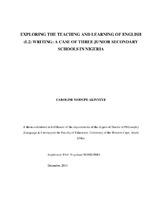| dc.description.abstract | Nigeria is one of the most multilingual nations in Africa which consists of over 450 languages (Adegbija, 2004; Danladi, 2013). It has a population of more than 150 million people, with three major languages, namely Hausa, Yoruba and Igbo, and a number of minority languages. Despite its linguistic and cultural diversity, English is the main medium of instruction from primary to tertiary education. The negative effects of learning through the medium of English second language (L2) are evidenced in the learners’ poor achievement in the external examination results of the National Examination Council (NECO) and the West African Examination Council (WAEC). There is an assumption that learners’ poor performance in English (L2) is due to little attention given to English writing in schools, and the use of less appropriate or effective teaching approaches (Babalola, 2011). There is a special concern about the poor writing proficiency levels of learners, particularly in the Junior Secondary School (JSS) phase which is an exit to Senior Secondary School level where learners are expected to show strong academic literacy skills. Writing is a process which is central to learners’ learning across the curriculum and it enables learners not only to access knowledge from different sources, but also to display the acquired knowledge in different domains. Learners’ poor writing skills are a great concern given that English (L2) is the main medium of instruction at all levels of education in Nigeria. In light of the above, this study set out to explore the pedagogical strategies and problems encountered by both teachers and learners in English (L2) academic writing in Junior Secondary School (JSS 3) classrooms in the Ekiti State, Nigeria. Guided by Second Language Acquisition theory, the study explored the factors that influence second language learning, in relation to the sociocultural and contextual factors that influence learners’ writing abilities. Through the lens of the Genre Pedagogical Theory and the Social Constructivist theory, it investigated teachers’ pedagogical strategies in English (L2) writing, and analysed learners’ written texts in order to understand the extent to which they reflected the features of specific genres that support learners’ writing skills. Four JSS3 teachers in three schools were purposively selected to participate in the study. The study employed a qualitative research paradigm, underpinned by the interpretive theory. Through the use of an ethnographic design, the day-to-day happenings such as thoughts and engagements of both teachers and students in the English (L2) lessons were observed and recorded by means of an audio-recorder in order to build a comprehensive record of the participants’ practice in the classroom. In addition, both semi-structured and unstructured interviews were conducted with the individual teachers. The students’ written texts and other relevant documents were collected and analysed for the purpose of data triangulation. Ethical considerations such as informed consent, voluntary participation, respect and anonymity of participants were observed throughout the study. In this study, the findings show that the teaching of English (L2) writing is still a challenge to many teachers due to a variety of factors which include linguistic, pedagogical and structural factors. As a result, learners’ academic writing suffers, especially writing to learn at secondary school level. Specifically, the findings of this study indicate that the teachers made use of traditional teaching approaches in the teaching of English (L2) writing as against the approaches recommended in the curriculum. The study also reveals that most of the JSS(3) students’ level of proficiency in English writing is below the expected levels stipulated in the curriculum document, although some of them displayed good basic interpersonal communication skills (BICS), Other contributing factors to the learners’ low academic writing proficiency in English (L2) include teachers’ limited understanding and application of the Genre-Based Approach in teaching writing, inadequate language teaching and learning resources, learners’ limited exposure to English (L2) and limited writing opportunities. The study concludes that while the use of the Genre-Based Approach is not the only strategy to enhance learners’ writing skills, the teaching of writing remains crucial as it is central to language use in different knowledge domains. Students’ writing proficiency is critical for cognitive and socio-economic development as it has implications for students’ access to knowledge and academic literacy which spills over to tertiary education. In a country like Nigeria where the main language of instruction is English, there is a need to prioritise teacher
development and to revisit the curriculum to determine how it meets the academic needs of learners in this century. | en_US |

